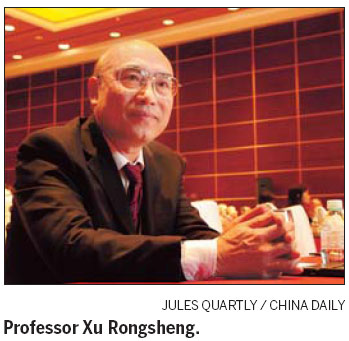Life and Leisure
'China's Father of the Internet' tracks the changes
By Jules Quartly (China Daily)
Updated: 2010-10-20 08:22
 |
Large Medium Small |
Professor Xu Rongsheng was responsible for the first Web page in China, which had the address www.ihep.ac.cn and was called "China Window". It's still up and running, though the link now migrates to the home page of the Institute of High Energy Physics, under the Chinese Academy of Sciences.
Xu, an unassuming gentleman with a beguiling sense of humor, said the "Father of the Internet" Tim Berners-Lee taught him how to create a Web page when he visited CERN (European Organization for Nuclear Research) in 1994.
"He gave me his small office and in it were all his published works. He explained to me the name 'World Wide Web' was used instead of 'World Wide Net' because it was easier to remember," said the man who is arguably "China's Father of the Internet".

Appropriately, Xu was the first guest speaker at China 2.0, The Rise of a Digital Superpower conference, in Beijing, that started on Monday and finished on Tuesday. He hooked up with his former colleague, Les Cottrell of Stanford University, in a video conference call to explain how the pair set up the country's first international Internet connection on March 2, 1993.
They were like an old couple, joking about how good it was to see each other again.
Cottrell said he recalled being asked to come to Beijing and set up an Internet link from the Institute of High Energy Physics to the Stanford Linear Accelerator Center in 1991. He thought the job would involve a "quick look at China and the Great Wall, but it turned into a three-year assignment".
"There were concerns about keeping a lid on information. But actually the United States end was harder to deal with. This was a major surprise," Cottrell said by video link.
Xu said he couldn't remember what the subject of his first e-mail was, but described the impact of the Internet as a "nuclear bomb" that led to an "information explosion".
After his speech, Xu said, with obvious pride, that his computer at the time is now an exhibit at the National Data Communication Museum in Beijing. The high energy physics graduate who studied at Peking University and University of California at Santa Cruz has obviously earned his place in history.
He said the Internet has transformed life in a way that was imaginable when he first set up the connection.
"My boy wants a 3D video on his phone and that's a reality. There's cloud computing, mobile computing and all the rest," he said. "The Internet has changed everything, whether it's at work, at home, in business, at leisure, or even in the car."
He admitted not all the changes were positive - and cited hacking as an example - but that was the nature of invention, it could be used for good or evil.
"It's like opening a window and everything comes in. The scientist is responsible for opening the window but not responsible for everything that comes in."
These days he wears a number of hats, including chief scientist of the Cyber Security Laboratory, which looks at ways of combating cyber crime, information security and computer forensics.
In contrast to some of the breathlessly upbeat, keynote speakers on the first day, Xu was more modest about the current level of China's Internet prowess.
"I'm not convinced that in terms of technical know-how and innovation we are a superpower yet, but in terms of population and influence we are. I think the title of the conference says it all. China is on the rise."
As for the future, he sees mobile phone security as the next big issue, as it takes over from the computer as an entry point to the Web. The only constant, he said, was change.
